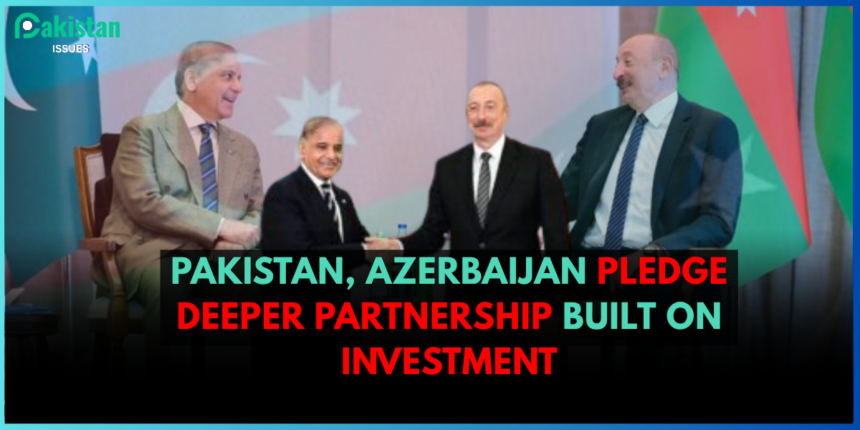ISLAMABAD / BAKU — The latest round of talks between Pakistan and Azerbaijan has ended with a simple, if ambitious, promise: put fresh capital at the center of a relationship that has long leaned on politics and defence cooperation but rarely touched its full economic potential.
Meeting in Baku on Tuesday, Prime Minister Shehbaz Sharif and President Ilham Aliyev agreed to steer their two governments toward an investment-first agenda. A joint communiqué released after the talks pointed to three priority lanes: energy, transport corridors and agriculture. The document is light on numbers but heavy on intent, signalling that both sides want to move quickly from warm words to contracts on paper.
Energy first
Pakistan’s delegation pushed hardest on liquefied-natural-gas imports and upstream participation. Islamabad is desperate to lock in stable fuel supplies at predictable prices; Baku, keen to diversify buyers beyond Europe, appears ready to oblige. Officials hinted at a multi-year LNG framework that could be announced before winter. SOCAR Trading and Pakistan LNG Limited are expected to resume negotiations in July, this time with political blessing from the top.
Azerbaijan’s side, meanwhile, asked for a clearer path into Pakistan’s downstream market—storage depots near Karachi and a possible joint venture refinery in Gwadar were mentioned. No timelines were set, but the idea has moved from “concept” to “due-diligence phase,” according to one commerce-ministry aide who briefed reporters off-camera.
Corridors and containers
Beyond gas, the two leaders talked geography. Azerbaijan wants assured access to Karachi and Gwadar ports; Pakistan wants a shorter overland route to the Black Sea. Both needs could converge in a rail-and-road corridor passing through Iran and Turkmenistan. The concept has floated in regional forums for years, yet rarely with this level of top-tier backing. Transport ministers have been told to table a feasibility sketch within six months.
Fields and food security
Agriculture, often overlooked in headline statements, received unusual attention. Pakistan proposed joint seed-research farms in Punjab and Sindh, tapping Azerbaijani expertise in dry-land wheat. Baku, which imports citrus and rice, asked for guaranteed quotas and streamlined phytosanitary rules. If customs officials can keep pace, a preferential-tariff schedule might follow by early 2026.
Why now?
Several pressures have nudged the two countries closer. Pakistan faces a chronic foreign-currency squeeze and needs investment that delivers jobs fast. Azerbaijan, flush with hydrocarbon revenue, is shopping for safe, medium-yield overseas projects. The political chemistry also helps: Islamabad backs Baku on Nagorno-Karabakh; Baku echoes Islamabad on Kashmir. There are few awkward subjects between them.
Cautious optimism
Sceptics, of course, remember previous rounds of enthusiasm that fizzled. A promised joint shipping line in 2017 never left the planning desk; a defence-industrial MoU from 2019 has yet to produce hardware. Officials this week insisted “implementation units” will track each pledge—a sober nod to past misfires.
For now, business chambers in Karachi and Baku are waiting for the first concrete step: a schedule for the inaugural Pakistan-Azerbaijan Investment Forum, tentatively set for October. If delegates turn up with term sheets instead of talking points, the partnership could finally move from warm rhetoric to hard rupees and manats.
Until then, the new watchword is investment—an easy promise on paper, a harder one in practice, but a necessary bet for two economies looking beyond familiar horizons.










